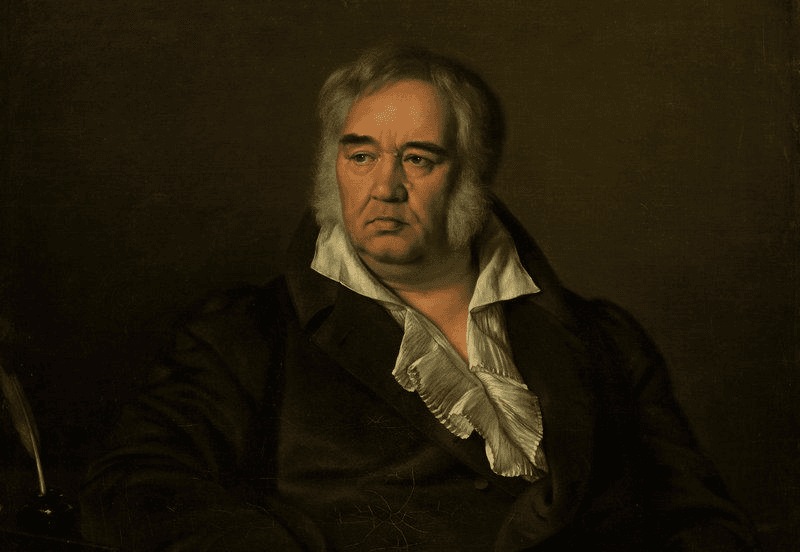For a long time it was believed that the cause of death of the classic of Russian literature was gluttony. This version sometimes appears on social networks even now. We decided to check if this is true.
About Krylov's death from overeating wrote a lot his contemporaries. But even now, two versions of the writer’s death often arise on social networks. By one of them, the cause of Krylov’s death was hazel grouse generously sprinkled with oil. By another, he ate too many pancakes. Every now and then on social networks appear both these “classical” hypotheses and others - for example, that moldy pies with cabbage.
There were legends about the gluttony of Ivan Krylov. “On Maslenitsa, at the Olenin’s... they served half-buckwheat pancakes the size of a plate and the thickness of a finger. Ivan Andreevich ate up to thirty of these pancakes, usually with caviar, in a sitting,” remembered Professor of the Imperial Academy of Arts Fyodor Solntsev. “If he were asked what word in the Russian language seems most tender to him, then I am sure that he would answer: my breadwinner. What to do! you can see his heart is in his stomach; from this source he drew most of his thoughts, and, to tell the truth, he was not badly inspired by it” - so described Krylova in his “Notes” by memoirist Philip Vigel.
Krylov, despite his passion for food, did not complain about his health until the last years of his life. Publicist Thaddeus Bulgarin dedicated to him essay in his newspaper “Northern Bee”. In particular, he wrote that Krylov “was a discerning gastronome, loved a good table and a glass of good wine, but did not indulge in excess and, being of a very strong and healthy build, was very rarely subject to illness.” However, further in the same essay, Bulgarin says that back in 1824, the writer, while hunting a bear, “suffered an apoplexy, from which the lower part of his face twisted.” However, by that time Krylov was in his sixties. Writer Pyotr Pletnev in the essay “The Life and Works of Ivan Andreevich Krylov” toldthat in the last years of his life the writer had to somewhat moderate his appetite: “Several years before his last illness, having experienced an attack of paralysis, it is true that in the remaining years he strictly observed not to eat many different foods, but even with two or three dishes, moderation was not his virtue.”
Krylov died in November 1844 at the age of 75. How testified Pletnev, all the last days his close friend General Yakov Rostovtsev was at the fabulist’s bedside. From him, contemporaries learned some details. In particular, about indigestion and about Krylov’s joke about this. “He died at eight o'clock in the morning, November 9, 1844, from indigestion in the stomach. A few hours before his death, he compared himself to a peasant who, having piled an excessively large load of fish on a cart, did not think of unnecessarily burdening his weak horse just because the fish was dried,” wrote the first biographer of the fabulist Mikhail Lobanov in 1847 in his book “The Life and Works of Ivan Krylov”. The same Lobanov also mentions hazel grouse for the first time: “In the dying days, having eaten some porridge with pureed hazel grouse for the last time, he stopped having both lunch and dinner. To know, his stomach, the unchanging servant of his whole life, could not perform his last service and thereby deprived us of the unforgettable Ivan Andreevich.” Pletnev added culinary details: “He ordered pureed hazel grouse to be served and doused them with oil.” His essay was printed in the same 1847 in the first volume of Krylov’s collected works.
It is obvious that both biographers (who, by the way, knew Krylov closely) willingly believed this version, although they themselves did not witness the last days of the writer. They did not write directly about gluttony, they did not specify the amount of food that evening, but they did not hide the fact that this meal was unnecessary. Krylov’s advanced age (75 years) was mentioned in passing. The story about hazel grouse quickly became a commonplace. In those biographies of Krylov where at least some details of his death were mentioned, hazel grouse were certainly mentioned - for example, in book 1886 "Ivan Andreevich Krylov and his fables." Often you can meet the statement that the “progenitor” of the myth about Krylov’s death from gluttony was Grand Duke Nikolai Mikhailovich Romanov. But he was born only in 1859, and his short biography of Krylov was published only in 1905 as part of collection "Russian portraits of the 18th and 19th centuries." There, however, about the cause of death it says rather dryly: Krylov died, “having become a victim of ordinary excess in food.”
The overeating version was the main one until the second half of the 20th century. But in the 1960s, researchers found an official document that put an end to the hazel grouse legend. In 1967 in the magazine “Russian Literature” article came out entitled “New materials for the biography of I. A. Krylov” and the subtitle “The truth about the death of Krylov.” Historian Nikolai Morenets discovered in the Central State Archives among the papers of the Alexander Nevsky Lavra the death certificate of Krylov, issued by his attending physician, doctor of medicine Ferdinand Haller. The document states: “This is given in the fact that the gentleman, actual state councilor and cavalier Ivan Andreevich Krylov, who was in my employ, actually suffered from pneumonia (Pneumonia nota) and by the will of God, on the 9th of this November of this year, 1844, he died from paralysis in the lungs. This is what I certify. St. Petersburg, November 11th day, 1844.”
Thus, the official cause of death of Ivan Krylov is not overeating or volvulus, but paralysis of the lungs, which developed as a result of pneumonia.
Cover image: Wikipedia
Not true
If you find a spelling or grammatical error, please let us know by highlighting the error text and clicking Ctrl+Enter.






